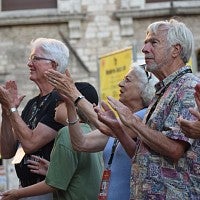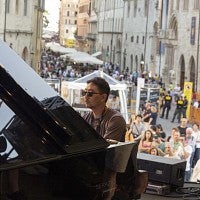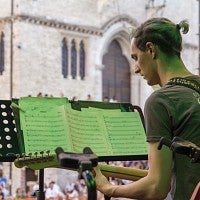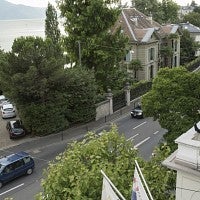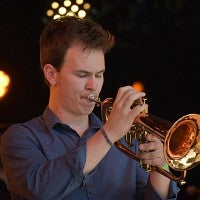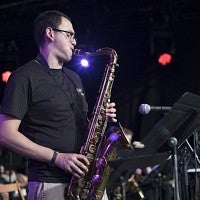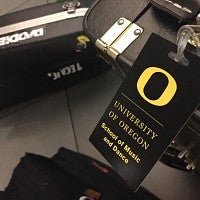What’s the best way to give a group of jazz students a taste of what it’s really like to be international performing artists?
How about a 10-day, three-country European tour, featuring shows at some of the world’s top jazz festivals.
“We have so few opportunities that require our students to have to play night in and night out, like professional touring groups do,” said Steve Owen, Philip H. Knight Professor of Jazz Studies at the University of Oregon School of Music and Dance. “Part of the challenge is learning to keep your focus and deal with adversity — to be able to walk off a bus and be able to play when conditions aren’t ideal.”
So, Owen decided to organize the trip of a lifetime this summer for 22 student members of his Oregon Jazz Ensemble, the university’s elite big-band jazz group.
Their tour included engagements at the famed Montreux Jazz Festival on the shores of Switzerland’s Lake Geneva, the Vienne Jazz Festival in France and the Umbria Jazz Festival, which is one of the largest and most prestigious events on Italy’s musical calendar.
“It’s always been my dream to play big jazz festivals, like Montreux and Umbria, but I never thought that I would be able to — especially at 19 (years of age),” said Nik Barber, a sophomore jazz studies major from Vancouver, Washington, who plays drums with the band.
Being on the bill alongside acclaimed jazz artists gave students a major morale boost.
“It’s just great to be able to play at some of these festivals that big-name musicians are playing at too,” said Whitehead, a jazz studies major from Eugene who’s entering his senior year. “It’s so inspiring, because that means I’m following in their footsteps and I can be like my favorite musicians. Instead of it being a fantasy, it can be a reality.”
The band’s set at the Vienne Jazz Festival earned an ovation from the audience and ended with the large crowd clapping in unison, asking for more.
“I feel honored to be a musician when I see people asking for an encore,” said Alexis Rosenberg, a senior from Thousand Oaks in Southern California, who’s double majoring in jazz studies and music education. “People at home aren’t as receptive to jazz as they are in Europe. Out here, you’ll see people having a great time, asking for encores as if it was a pop concert in America. It made me enjoy it more too!”
For many students, it was their first time travelling outside the United States.
“The venues and landscapes, I think that was the most breathtaking aspect of the trip; looking out in the distance and seeing the Alps or a beautiful lake or a castle,” said Jonathan Corona, a master’s student in saxophone performance and jazz studies from Bend.
Sightseeing trips to historical and cultural landmarks offered opportunities to reinforce lessons learned back in the classroom. Students got the chance to see illuminated early music manuscripts in the library of the famous medieval cathedral in the Italian city of Siena.
“We learn about it in school, but when you see the physical thing that it represents, it grounds it in reality,” said Ellie Jakes, a master’s student in jazz composition from McClean, Virginia, outside of Washington, D.C. “Descriptions and pictures don’t compare. They never can match the actual feeling of being there.”
The rigors of life on the road helped the students forge stronger personal relationships and play better as a band, said instructor of jazz studies Paul Krueger, who accompanied the band on tour.
“They end up coming closer together,” Krueger said. “They’re hanging out on the bus or having dinner together, so they end up developing those close personal relationships, and it really changes how the music sounds …. They perform at a higher level and with more passion.”
The tour also gave jazz program patrons the chance to see some of the students they’ve personally supported through scholarships apply their college lessons in professional performance settings.
“I’ve seen Ken (Mastrogiovanni) play drums so many times at the Jazz Station (in downtown Eugene), and to see him on the world stage in Montreux, it’s really heartwarming,” said Herbert Merker, a 1962 UO grad who established the JazzArts Oregon Combo Scholarship Endowment in 2015 to fund up to six scholarships each year. “The whole thing just reinforces my feeling for the jazz program.”
Patron Marcy Hammock said watching audiences across Europe respond so enthusiastically to student performances proved the old adage that music is a universal language.
“Most of the people that were in the audience didn’t speak English, but they understood the music and they appreciated it,” Hammock said. “They were awakened by the similarities of our cultures through music and the fact that jazz is truly an American art form that’s appreciated around the world.”
—By Steve Fyffe, School of Music and Dance


